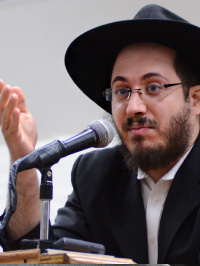 Dear Reader sh’yichyeh:
Dear Reader sh’yichyeh:
Regarding the Yom Tov of Chanuka, the Gemara (Shabbos 21b) says: “What is [the reason for] Hanukkah? For our Rabbis taught: On the twenty-fifth of Kislev [commence] the days of Chanukah, which are eight, on which a lamentation for the dead and fasting are forbidden. For when the Greeks entered the Temple, they defiled all the oils therein, and when the Hasmonean dynasty prevailed over and defeated them, they made a search and found only one cruse of oil which lay with the seal of the High Priest, but which contained sufficient oil for one day’s lighting only; yet a miracle was wrought therein and they lit [the lamp] therewith for eight days. The following year these [days] were appointed as a Festival with [the recital of] Hallel and thanksgiving.”
What is the history behind the “one cruse of oil which lay with the seal of the High Priest?” The Sifsei Kohen Al HaTorah explains that this flask was the famous flask of the Shemen HaMishcha–anointing oil that was prepared by Moshe Rabbeinu. It was used to anoint Kings and High Priests as well as the vessels in the Mishkan. It was hidden during the time of the second Beis HaMikdash (see Rambam Hilchos Beis HaBechira 4:1), and was miraculously found and used to light the Menorah.
The Gemara (Horiyus 11b) tells us that the Shemen HaMishcha will reappear in the times of Moshiach. “Our Rabbis taught: The anointing oil which Moshe prepared in the wilderness was used for the boiling of the roots; these are the words of R. Yehudah. R. Yose said: Surely it did not suffice even for the dabbing of the roots! But the roots were soaked in water and over its surface the oil was poured, which thus absorbed the scent and retained it. Said R. Judah to him: Did, then, only one miracle happen with the anointing oil? Surely, it was originally only twelve logs and with it was anointed the Tabernacle and its furniture, Aaron and his sons throughout the seven days of consecration, and all of it still remained intact for the time of Moshiach, as it is said (Shmos 30:31), ‘This shall be a holy anointing oil unto Me throughout your generations.’”
From the above it would seem to be clear that Melech HaMoshiach (literally translated to mean “the anointed king”) would need to be anointed with this special oil. This however is far from simple. The Minchas Chinuch (mitzva 107) explains the two sides of the question:
The rule is (See Rambam Hilchos Melachim 1:12): “A son who succeeds his father as king is not anointed unless he assumes his position amid a dispute over the inheritance or during a civil war. Under these circumstances, he should be anointed in order to remove all disagreement. Therefore, they anointed Shlomo because of the claim of Adoniyahu; Yehoash, because of the usurpation of Atalyah; and Yehoachaz, because of [the claim of his brother, Yehoyakim.”
What would the ruling be if a king died and left two disputing sons, but before the dispute is settled, they both die? At that point the people elect a grandson unanimously. Do we say that being that there is no objection to him, that he does not need anointment? Or do we say that since, had his father been king, his father would have needed to be anointed (because of the fight with his brother) the same would apply to his son? There is no clear Halachic ruling on this question.
The Minchas Chinuch explains (Ibid.) that regarding Melech HaMoshiach, the same question applies. In normal circumstances, considering that we have not been lead by a king from the Davidic Dynasty for many generations, that should warrant a new anointment of King Moshiach, especially since Shlomo HaMelech’s son (Rechavam) did not rule without his kingship being challenged. On the other hand, since Moshiach himself will be accepted by all Jews, it is possible that he will not need to be anointed. (See Seifer Yemos HaMoshiach B’halacha Vol. 2 page 130 for more on this discussion.)
Let’s finish this discussion with the words of the Rebbe (Mishpatim 5751). “The appointment of David, the King Moshiach, has already occurred, as it says, ‘I have found David My servant, with My holy oil I have anointed him.’ It requires only an acceptance of his kingship by the people and a complete revelation of the attachment between the king and the people – in the true and perfect Redemption.”
Rabbi Avtzon is the Rosh Yeshiva of Yeshivas Lubavitch Cincinnati and a well sought after speaker and lecturer. Recordings of his in-depth shiurim on Inyanei Geula u’Moshiach can be accessed at http://www.ylcrecording.com.
***
We have received many requests to make available to the public our weekly column on Inyanei Moshiach and Geula. B”H in honor of 19 Kislev, we have put together the columns topically, and they are now available at Amazon.com!
You can order them online at http://www.amazon.com/s/ref=nb_sb_noss_1?url=search-alias%3Daps&field-keywords=gershon+avtzon